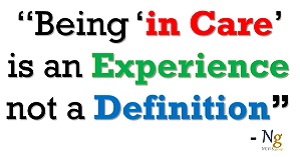Unconscious bias in the interview room
Joe Rankin, CEO and James Calder, Coffee and Bistro Manager at Nevis Group discuss what Nevis can offer young people with care experience.
Hiding care experience seems to be the better option
Many of us like to think that we're well rounded, good-hearted individuals that don't judge people, but would you believe me if I told you that on a subconscious level we make snap judgements all the time? This goes for everyone regardless of age, sex, creed, colour and life-experiences. We call this the 'unconscious bias'. The unconscious bias is even more prevalent in the interview room. Before you have even arrived, the interviewer has already made decisions about you, whether they know it or not.
When you fill in an application for that job you've seen on a website - what information are you providing about yourself? As well as your educational achievements, work experience and references, you are also giving them your name, date of birth, address history (10 years' worth in some cases), ethnic identity, mental and physical disabilities and let's not forget your interests. So, before you even cross the door, the interviewer already has a very 'clear' image of who you are, and more so, they have already decided, from that two or three pages whether you are the right fit for the job.
And there it is, their unconscious bias has already made the decision for them, and it has the ability to change your life. The two sad points about this are: 1) the person reading your application has no idea that they have just made an unconscious decision, and 2) the reasons that helped them reach that decision are deeply rooted in their own discriminations. Now, think about this from a care experienced individual's point of view. And the simple question is 'do I have a better chance of getting this job if I share or hide my care experience?' The sad reality is that hiding that experience seems to be the better option. Someone recently posted on Twitter about a question he was asked at a job interview - "what did you do to be placed in the care system?"...
Support into employment


More emphasis must be given to the support that can be provided into employment. Work is the place where we meet friends and sometimes loved ones that we will go through the rest of our lives with. We must make the working environment a safe place for care experienced people to share their experience, safe in the knowledge that they will not be judged.
The only way that we can make this happen is to turn our attention to challenging unconscious bias and raising awareness of the stigma that is pinned to an individual just because we were not 'fortunate' enough to live at home.
As I write this, the Life Changes Trust has just released 'Public attitudes to care experienced young people'. This report provides evidence that would suggest a shift in public perceptions in favour of care experienced young people and adults. Sadly, it also highlights that there is still around a third of the Scottish population that have negative images of looked after young people and care experienced adults. It states: 'Such negative attitudes need to be challenged if people with care experience are going to be able to lead fulfilling lives free from stigma and discrimination.' (Diana Bardsley, 2018).
How do we do that? We must take a look at ourselves and challenge our perceptions, remaining open by remembering that 'people' are products of society, so if society and the individuals in it are led by their own negative biases, unconscious or otherwise, is it any wonder that the stigma around looked after young people and care experienced adults remains?
Make sure that YOU don't fall into that trap, thinking that because one care experienced individual is 'bad', that they all must be. That's when your unconscious bias sneaks up on you.
The views expressed in this blog post are those of the author/s and may not represent the views or opinions of CELCIS or our funders.
Commenting on the blog posts
Sharing comments and perspectives prompted by the posts on this blog are welcome. CELCIS operates a moderation process so your comment will not go live straight away.


